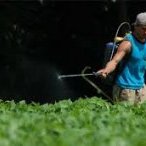English · Español

18 de septiembre de 2013 | Informes especiales | Bosques y biodiversidad | Derechos humanos | Soberanía Alimentaria
Contribution at risk
El Salvador: MOVIAC Celebrates Ban on 53 Agrotoxics and Demands Immediate Government Enforcement
Descargar: MP3 (1.6 MB)
The Salvadoran Congress recently passed a ban on the use and commercialization of over 50 active principles of agrotoxics. The Movement of People Affected by Climate Change and Megaprojects (MOVIAC) in El Salvador considered the move a positive contribution to society.
In a press conference held by the organization on Monday 16th, in San Salvador, members of MOVIAC said the agrarian corporations are increasingly pressuring Salvadoran President Mauricio Funes to veto the measure. They demanded the government’s immediate enforcement of the ban.
The advocates of agribusiness claim that without them they would not be able to supply food for the population and plagues and weeds would abound.
MOVIAC representatives feel that banning the use of agrochemicals is a very important step, since it would prevent diseases such as kidney failure and cancer, and it would also prevent environmental pollution, especially the soil and the water streams.
“We would like to acknowledge the Legislative Assembly’s contribution to society. We believe this is a very important reform because it not only prevents future health risks, but it also prevents environmental pollution”, said Jose Acosta representative of VOCES en la Frontera and member of MOVIAC.
Acosta said the current model poses a threat to nature.
MOVIAC representatives were concerned about the misleading campaign of big corporations who claim farmers will not be able to work without using agrochemicals, something that has been imposed by the current ruling model in the country.
The members of MOVIAC said changing the model of agriculture is key to protection of people and the environment. They called the attention of the government and the farmers to the fact that there are new forms of agriculture to protect the ecosystems that do not need to use synthetic fertilizers.
Pros and cons
Meanwhile, La Via Campesina El Salvador expressed its public support for the ban.
“The current use of agrotoxics in large scale agricultural production, especially sugar cane plantations, impacts human health and the environment. It is having very high costs that are not paid for by the big producers, but by the population, the communities, the State”, reads a public statement of the National Rural Workers Council (CNTC).
“One of the impacts of agrotoxics is kidney failure and diabetes, which have great costs for families and the State. The use of ripeners in sugar cane (Glyphosate) has economic benefits for large scale sugar cane producers, but this does not translate to a living wage for the workers, let alone in cheap sugar for the industry”.
System change
“MOVIAC is demanding that the President immediately reform the law, because we believe that, rather than damaging our farmers, it will create better food conditions”, said Silvia Quiroa, Head of CESTA and MOVIAC representative.
The environmental activist pointed out that knowledge and technology for food production are being developed in an agroecological way. She mentioned the need for a Food Sovereignty law that will render the farmers free from taxes they would have to pay to agribusiness transnational corporations that sell seeds, synthetic biology, pesticides and chemical fertilizers.
Quiroa also highlighted the impacts of free trade agreements, such as the one recently ratified between Central America and the European Union, on autonomic food production.
MOVIAC told Real World Radio that they are preparing an international campaign to write messages to the Salvadoran authorities to express their support for the passing of the law and underscoring that the products that have been banned have often been recalled from their own countries of origin.
Photo: elmundo.com.sv








